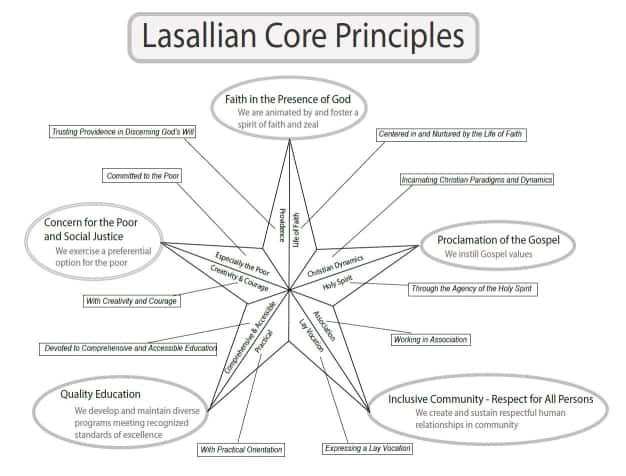The Lasallian Tradition follows the principles of the founder of the order, St. John Baptist de La Salle, who was a wealthy French priest in the seventeenth century. Because of his financial support of a girls’ school run by the Sisters of the Child Jesus religious order, he was approached to help open boys’ schools.
Upon making this financial commitment, he quickly found himself essentially in charge of these schools. During this time period of the late 1600s, there were already other schools open in France. The wealthy attended “writing schools” while families from the poorer ranks of society attended parish schools, or “little schools.” Little schools were a bit disorganized and subjects were taught in Latin. The primary focus was on teaching the catechism.
As a priest, De La Salle knew the importance of the catechism and it was a main focus of his schools as well, but he also recognized the practical needs of the students in the real world. De La Salle’s schools taught subjects in the vernacular (the language of the people) and focused on the needs of the students. Schools were open as a means of salvation for the working class and poor. By addressing the spiritual and the societal needs of students, this salvation came from both this world as well as the next.
As the first “Lasallian” schools opened, it was evident that the teachers needed some guidance. The first teacher formation began with De La Salle taking teachers into his own home and guiding them in social graces as well as discipline and curriculum matters. Through a lot of rough beginnings, he and two Brothers made what is known as the Heroic Vow where they decided that no matter what, they would keep the schools open—even if it meant living on bread alone.
When De La Salle died after 40 years of this work, there were only about 100 men who had dedicated their lives to following his example of teaching the students of the poor and working class. He probably had no idea that his efforts would be perpetuated all the way into the twenty-first century. In 2011, there are Lasallian schools in over 84 countries, with 6,000 brothers working with 77,000 lay people teaching 900,000 students. Each religious order has a different charism that is based on the contributions of each particular founder, but we all operate under the auspices of the Catholic Church. The actions of our Institute are approved by the pope.
So, we are all Catholic, but as Lasallians we continue to follow the example of De La Salle, whose example was so great that he was named the patron saint of all teachers in 1950 and his statue is located towards the front of St. Peter’s Cathedral in Vatican City.
As Lasallians, we are following a shining example of Catholic education at its finest, one who brought both the spiritual life and the everyday life together so that students know that everything they do in this world is a means of salvation in the next. I think we have something special at De La Salle College Mangere that other schools don’t have: we have a charism—a story. The De La Salle Brothers ask us to share that story so that the spirit is not forgotten, so that the mission of all Lasallian schools is not forgotten or lost in today’s world.
We are a Catholic school. We continue to share the story of St. John Baptist de La Salle and by following his example we focus on the needs of all our students by providing them with a quality education that not only teaches a challenging curriculum, but also challenges students to have a better relationship with God so that His spirit may be spread throughout the world. That is why we focus and stress being open to all, so that we can help all come to know God on a more personal level. God wants all of us to love Him and to share that love with others so that tomorrow can be better than today.
The work of Lasallian schools is immense. God’s work is alive through the Brothers today and those who came before—and there were many who came before—as well as the many Lasallian Partners who work to carry on the mission and tradition. Unfortunately, there are not as many Brothers in our schools and so it is imperative that we—as teachers, administrators, students, parents, alumni and trustees—talk about what it means to be Lasallian. Our school population is not 100% Catholic, but we are all called to love and serve God and that is really what it means to be Lasallian.
St. John Baptist de La Salle dedicated his life to responding to God’s call. He deepened his relationship with God through constant prayer. So, truly being Lasallian means to follow his example, and maybe when we are on our death beds our words can echo De La Salle’s: “Yes, I adore God guiding me in all the events of my life.
The Lasallian Identity
A Catholic school is one that is conducted to minister to its members by teaching and modelling the Gospel of Jesus Christ as expressed in the Sacred Scripture and Tradition of the Roman Catholic Church. Catholic schools are inspired by a supernatural vision, founded on Christian anthropology, animated by communion and community, imbued with a Catholic worldview throughout their curricula, and sustained by gospel witness. As a Catholic school, De La Salle College Mangere strives to honour God by giving to its students a Catholic education in a culture of faith, dignity, justice, service, and love.
A Lasallian school is one that is conducted in association with the worldwide Lasallian educational mission, the word Lasallian coming from the name of the founder of the Brothers of the Christian Schools, St. John Baptist de La Salle. Lasallian schools are characterized by excellence in teaching, loving mentor relationships between teachers and students, special attention to the poor and marginalized, and devotion to the salvation of each student. As a Lasallian school, De La Salle Mangere embodies this Lasallian spirit of faith in God and zeal for announcing the Gospel of Jesus Christ through our unconditional care and vigilance for our students in a school filled with God’s loving and saving presence.
The Lasallian Mission
The Lasallian Mission is an apostolic ministry of the Catholic Church that:
– Provides a human and Christian education to all youth
– Especially the poor and marginalized
– In ministries conducted as places of salvation
– By professionals acting together and by association for the sake of this mission
As mentioned, the Lasallian movement encompasses 84 countries where 5,500 De La Salle Brothers and 73,000 lay partners serve 900,000 students in 94 ministries. In New Zealand we have three Lasallian Schools. De La Salle Mangere East in Auckland, John Paul College in Rotorua and Francis Douglas Memorial College in New Plymouth.
The Lasallian Five Core Principles
Lasallian schools are characterized by a 300-plus year tradition of student-centred, salvation-centred education. This tradition is well-expressed in the Five Core Principles of Lasallian Schools:
Faith in the Presence of God
The Lasallian school nurtures belief in the living presence of God in our world. Faith in the presence of God calls all students into a deeper awareness of their saving relationship with a caring and loving God and to see the world through the “eyes of faith”. At De La Salle College, this core principle is reflected each day through this Lasallian expression of faith: “Let us remember that we are in the Holy Presence of God.”
Concern for the Poor and Social Justice
The Lasallian school calls its members to an awareness of the poor and victims of injustice and responds to their needs through programs of community service, advocacy, and justice education. At De La Salle College, this core principle is reflected each day through the Lasallian vision of Gospel living: “Enter to Learn, Leave to Serve”.
Respect for All Persons
The Lasallian school engages in a concerted effort to respect the dignity of all persons. Respect-filled relationships are at the heart of Lasallian education and are a key expression of the acknowledgement of each other’s identity as children of God. At De La Salle College, this core principle is reflected each day through this Lasallian mantra: “Live Jesus in our hearts…Forever.”
Quality Education
The Lasallian school provides an education that prepares students not only for college and career but also for life. This education advances the students’ abilities to use their talents to critically examine the world in light of the message of the Gospels and to take greater responsibility for their own education. At De La Salle College, this core principle is reflected each day through this Lasallian ideal: “Teaching Minds and Touching Hearts”.
Inclusive Community
The Lasallian school is a united community where diversity is respected, where no one is left out, and where everyone finds a place. Individuals within the school community recognize and accept another’s strengths and limitations. At De La Salle College, this core principle is reflected each day through this Lasallian ideal: “The De La Salle Family.”


